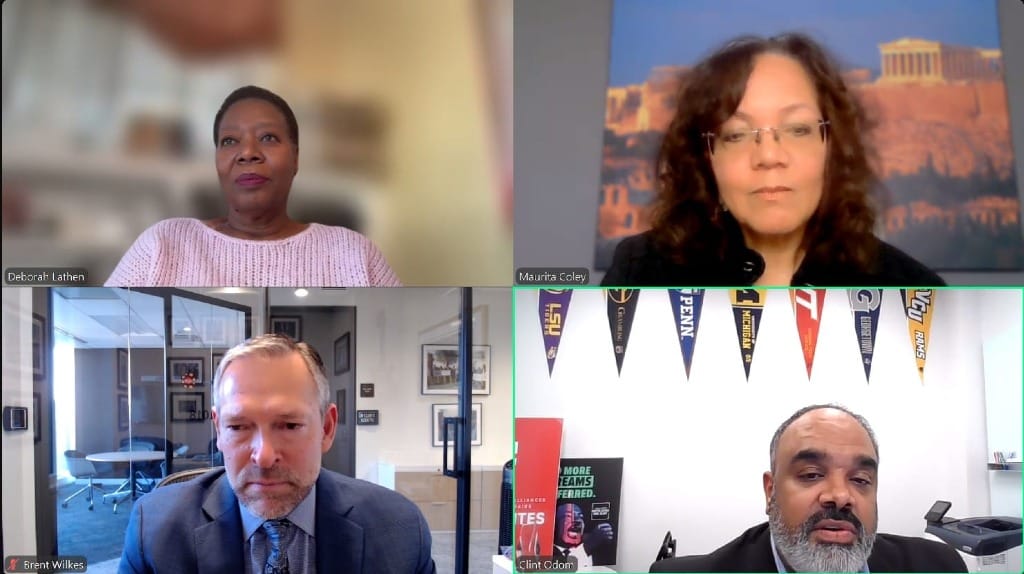Equity on the Line: Telecom’s DEI Dilemma
FCC ends DEI priorities after Trump’s executive order, leaving telecom’s equity mandates in limbo.
Jericho Casper

WASHINGTON, Jan. 28, 2025 – Advocates for racial diversity and equity in the telecommunications industry expressed shock and confusion about how to reconcile recent Trump administration orders with longstanding practice and law.
Diversity, equity and inclusion were not just goals, but legal mandates for the telecommunications industry, experts said during a Federal Communications Bar Association session Tuesday.
The Trump White House issued an executive order on January 20 to eliminate DEI programs across federal agencies. This Inauguration Day directive, calling DEI efforts "illegal and immoral discrimination programs," came after major tech companies Meta, Amazon, and Apple had already scaled back DEI initiatives.
But for industries like telecom, panelists warned that the rollback of DEI initiatives threatens decades of progress to ensure diversity in leadership and equity in communications.
The Communications Act puts telecom in a unique position
Several panelists pointed to the telecom sector’s unique position. Principles of equity are grounded in foundational laws like the Communications Act of 1934 and the Telecommunications Act of 1996, panelists said.
For example, Clint Odom, vice president of strategic alliances and external affairs at T-Mobile, emphasized that DEI principles aren’t just modern buzzwords but were deeply rooted in constitutional amendments – including the 13th, 14th, 15th, and 19th – and reinforced by law.
“It’s enshrined in the statute,” Odom emphasized, referring to the Communications Act. “We can’t read it out of existence — it is there.”
The Communications Act requires that telecommunications services be made available “so far as possible, to all people of the United States, without discrimination on the basis of race, color, religion, national origin, or sex.”
The Telecommunications Act of 1996 reaffirmed principles of equity by emphasizing universal access to telecommunications services, panelists said. And the Infrastructure Investment and Jobs Act of 2021 explicitly prohibited digital discrimination – based on income, race, ethnicity, or geography – in the rollout of broadband infrastructure.
Rollback?
Yet, on January 21, FCC Chairman Brendan Carr announced sweeping changes to align the FCC with the Trump administration’s executive order to dismantle DEI initiatives across federal agencies.
In a public statement, Carr declared the FCC’s intention to eliminate DEI as a strategic priority, and to dismantle programs established under the Biden administration that aimed to ensure equitable access to communications services. Such an initiative would appear to include the FCC’s digital discrimination rules, which remains intact for now, although it is under review by the Eighth Circuit Court of Appeals.
Carr’s announcement included a detailed plan to rescind the FCC’s 2022 Equity Action Plan, disband the Communications Equity and Diversity Council, and eliminate DEI priorities from the agency’s strategic plans, budgets, performance plans, and advisory committee directives.
“Carr is going to walk a very, very difficult line here between what is required of him by law for the FCC and what is dictated to him from the White House,” said Deborah Lathen, president of Lathen Consulting and former chief of the FCC’s Cable Services Bureau.
Carr must navigate the political reality of serving under an administration that has openly criticized DEI as discriminatory and wasteful, she said. Yet, Carr’s legal obligations as FCC chairman are rooted in law and policy emphasizing equity, access, and inclusivity in telecommunications.
Long-standing policies at the FCC
Additionally, the FCC has long pursued policies that promote diversity and inclusion. These include the FCC’s Equal Employment Opportunity rules, which ensure that broadcast license holders comply with diverse hiring practices. Historical programs like the Minority Tax Certificate Program (1978-1995) and the Designated Entity Rules for Spectrum Auctions created pathways for minority- and women-owned businesses to participate in telecom ownership and spectrum allocation.
Indeed, the panel’s conversations reflected a growing tension between the historical intent of DEI — ensuring equal opportunity and addressing systemic inequities — and what they called its increasingly politicized framing.
Panelists pointed to the Trump administration’s recent executive order as a pivotal moment, with its rhetoric labeling DEI initiatives as “woke” and “Marxist ideology.” The shift recasts equity and inclusion as controversial and even exclusionary.
Odom pointed to a stark contrast between today’s rhetoric and the Republican Party’s approach to diversity and inclusion in the past. He quoted former FCC Republican Chairman Michael Powell, who in 2003 said, “It is essential that we promote greater inclusiveness in our media and communications delivery sectors.”
“From the White House, to FCC commissioners, this has not historically been a controversial area of public policy,” Odom said. The Trump White House may force agencies like the FCC to reevaluate long-standing commitments.









Member discussion